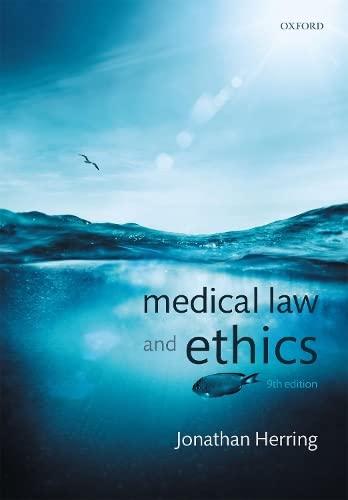Question
Alternative Dispute Resolution Canadian Context 1. What are the guiding principles of the Law Society of Upper Canada? Provide the statutory or other authority for
Alternative Dispute Resolution Canadian Context
1. What are the guiding principles of the Law Society of Upper Canada? Provide the statutory or other authority for your answer.
2. What legislation provides the Law Society of Upper Canada with the power and authority to regulate the legal profession in Ontario?
3. What is the function of the Law Society? Provide the statutory or other authority for your answer.
4. The Law Society is considered a "self-regulated body." Describe what that means and how such a body would function
5. As members of the Law Society, paralegals must adhere to professional and ethical obligations. List the various authorities that set out those obligations.
6. Define a code of conduct and list the elements of the code of conduct that applies to paralegals and to lawyers. Describe the purpose of that code of conduct as it relates to paralegals.
7. List and describe the nine rules of the Paralegal Rules of Conduct.
8. Which specific sections of the Paralegal Rules of Conduct make reference to alternative dispute resolution?
9. Describe and distinguish between substantive and procedural law.
10. Generally, when should ADR be considered during the litigation process? Describe the advantages and disadvantages and what factors should be considered in your answer.
11. What is the paralegal's responsibility with respect to the client and settlement?
12. Can a paralegal be a mediator? Provide the statutory or other authority for your answer.
13. You have been hired as a paralegal to represent a new client and bring an action before the Small Claims Court. At issue is the fact that your client was hired to renovate a house, and the owner has refused to pay him saying that it was "shoddy workmanship. "Your client is quite angry and is eager to take this case "all the way to the Supreme Court of Canada" if he has to. You decide to file the claim immediately without properly discussing the possible courses of action with your client. Discuss the possible ethical breaches in accordance with the Paralegal Rules of Conduct.
14. You have been contacted by the opposing party to attend at a mediation with your client. It is quite early in the litigation process, and you have not received much of the evidence or documents that you need to properly understand the case. You feel that the mediation is too soon. What issues should you be concerned about in having the mediation take place too early in the litigation process?
Step by Step Solution
There are 3 Steps involved in it
Step: 1

Get Instant Access to Expert-Tailored Solutions
See step-by-step solutions with expert insights and AI powered tools for academic success
Step: 2

Step: 3

Ace Your Homework with AI
Get the answers you need in no time with our AI-driven, step-by-step assistance
Get Started


